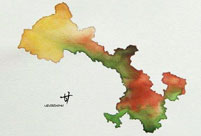 Africans in Guangzhou
Africans in Guangzhou
 Pole dancer shows strength and beauty up in the air
Pole dancer shows strength and beauty up in the air
 College girls call for protection of ecological space on earth
College girls call for protection of ecological space on earth
 Top 10 celebrities driving auto brands
Top 10 celebrities driving auto brands
 10 low-carbon tips to save money
10 low-carbon tips to save money
 Luxury cars make Asia premiere at Auto China
Luxury cars make Asia premiere at Auto China
 Versatile dog
Versatile dog
 Ni Ni covers BAZAAR JEWELRY
Ni Ni covers BAZAAR JEWELRY
 Cherry blossoms reach peak bloom in Washington D.C.
Cherry blossoms reach peak bloom in Washington D.C.
 Top Chinese fashion icons in foreigners' eyes
Top Chinese fashion icons in foreigners' eyes
BOSTON, the United States, April 25-- The U.S.-Japan security treaty is a bilateral arrangement and should not cover Chinese territory, Chinese Ambassador Cui Tiankai said on Friday.
The U.S.-Japan alliance "should not affect the interests of a third country," Cui said at the John F. Kennedy School of Government of the Harvard University.
"Our positions are quite clear. The Diaoyu Islands are Chinese territory," the Chinese envoy told Harvard students in response to a question on the territorial disputes between China and Japan over a chain of islands in the East China Sea.
U.S. President Barack Obama assured Japan during a visit to the country on Thursday that Washington was committed to its defense, applying the U.S.-Japan security treaty to the disputed Diaoyu Islands. China has expressed grave concerns over the statement.
Pointing out that the U.S.-Japan alliance originated in the Cold-War years, Cui said, "Is it really up-to-date? Or is it appropriate for the challenges of the 21st century? I don't think such alliance will help us."
Cui said while Washington tells Beijing that it is taking no position on the issue of Diaoyu Islands, "it seems to me that it does take some sides, and probably take the wrong side."
The convergence of interests, Cui said, helps build the bonds between China and other Asia-Pacific countries, which "are stronger, longer-lasting and more resilient than those of old-fashioned alliances."
"In this sense, there is no need for us to pivot or rebalance in Asia-Pacific, because this is our homeland. Our roots are here, and our priority never shifts," he said.
Cui added that the new model of China-U.S. relationship is seeking to build aims at win-win cooperation on the basis of mutual respect and requires "positive energy" from both sides.
"It is not about playing with words. Serious commitments have to be made and honored by both sides," the ambassador said.
Cui said China recognizes U.S. presence and interests in the Asia-Pacific region and welcomes the constructive role by the United States in regional affairs.
"We hope that the United States will join the regional quest for 21st century solutions for the challenges before us, so that Asia-Pacific will enjoy lasting peace and widespread prosperity," he said.
 Hand-painted maps go viral online; painter's name remains unknown
Hand-painted maps go viral online; painter's name remains unknown 4th Beijing Int'l Film Festival ends
4th Beijing Int'l Film Festival ends Commando elite specializes in sign language
Commando elite specializes in sign language Man photoshops himself into girlfriend's childhood photos
Man photoshops himself into girlfriend's childhood photos Photo story: Stallholders at Beijing Zoo Wholesale Market
Photo story: Stallholders at Beijing Zoo Wholesale Market Artists on backstage
Artists on backstage Beckham launches fund to support youth soccer in China
Beckham launches fund to support youth soccer in China Cherry blossoms hit peak bloom in Washington D.C.
Cherry blossoms hit peak bloom in Washington D.C. Children in ancient costumes learn Zhusuan
Children in ancient costumes learn Zhusuan Cute Shaolin boy melts the hearts of millions
Cute Shaolin boy melts the hearts of millions Giant panda Sijia is back to happy life
Giant panda Sijia is back to happy life Richest Chinese of 2014: half from the mainland
Richest Chinese of 2014: half from the mainland Chengdu - laid-back lifestyle makes happiest city
Chengdu - laid-back lifestyle makes happiest city The backstage of the Fashion Week
The backstage of the Fashion Week College students in Han costumes
College students in Han costumesDay|Week|Month